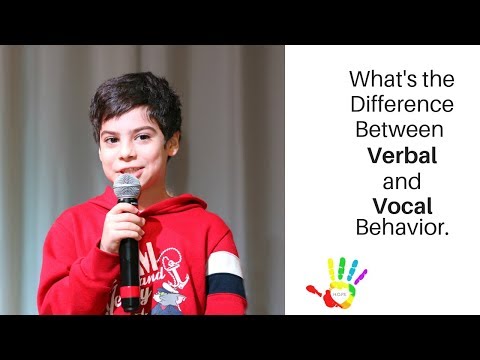In this short video, Jessica explains the difference between verbal and vocal behavior.
Photo: Morguefile
Sound effect: Incomputek
Intro: Graeme Kan
Video Production: Highlander Productions
Disclaimer:
This video is intended for information purposes only. It is not intended to diagnose or treat any medical condition. The text, graphics, images, flash movies, and audio segments are not intended to be a substitute for professional medical advice, diagnosis, or treatment. Always seek the advice of your physician or other qualified health provider with any questions you may have regarding a medical condition.
The information contained in this segment is generalized. It may not be applicable in every situation. Before applying specific interventions, consult a behaviorist. Any behavior intervention can result in an undesired change in behavior if not implemented correctly. No client relationship is established as a result of watching these videos. Jessica Leichtweisz and Hope Education cannot be held responsible for any misuse of the information contained in these videos. <br> <h3>Auto Generated Captions</h3>
[Music]
hi and welcome back my name is Jessica
likewise founder and CEO of hope
education services every week at postive
video about autism and ABA answering
questions you might have about how to
help your child the best so today’s
question is what’s the difference
between verbal and vocal behavior one of
the most common phrases I hear people
using to describe children with autism
is saying that their child or that their
student is non-verbal that’s not correct
there’s no such thing as having a person
a person being non-verbal a person could
be non vocal so what’s the difference
between being vocal and verbal so vocal
behavior refers to speech anything that
spoken is vocal something can be vocal
and not necessarily verbal so for
example if I’m singing in the shower I’m
engaging in a vocal behavior I’m singing
but if no one’s around to hear for it
it’s not actually verbal behavior so
what verbal behavior is it’s language
that has the intention of communicating
and it’s not limited to just speech so
for example sign language is a type of
verbal behavior making eye contact could
be a verbal behavior pointing to
something could be a verbal behavior any
time you’re engaging in an attempt to
communicate with another person it’s
considered a verbal behavior let’s say
you’re driving down the freeway and you
honk your horn at someone in a passing
car that’s a verbal behavior so put
simply vocal behavior is spoken language
and verbal behavior is a behavior that
attempts to communicate with another
person so I hope that answers your
question
I’d love to get your questions so thank
you so the person who sent that in if
you have any other questions please feel
free to email me at Jessica at Jessica
likewise calm I do my best to answer
every question that I get please check
out our other
and don’t forget to subscribe we’re
posting a video every week until then
have a great week
[Music]
you
What's the Difference Between Verbal and Vocal Behavior? a_lGMFgT3lc
[Music]
hi and welcome back my name is Jessica
likewise founder and CEO of hope
education services every week at postive
video about autism and ABA answering
questions you might have about how to
help your child the best so today’s
question is what’s the difference
between verbal and vocal behavior one of
the most common phrases I hear people
using to describe children with autism
is saying that their child or that their
student is non-verbal that’s not correct
there’s no such thing as having a person
a person being non-verbal a person could
be non vocal so what’s the difference
between being vocal and verbal so vocal
behavior refers to speech anything that
spoken is vocal something can be vocal
and not necessarily verbal so for
example if I’m singing in the shower I’m
engaging in a vocal behavior I’m singing
but if no one’s around to hear for it
it’s not actually verbal behavior so
what verbal behavior is it’s language
that has the intention of communicating
and it’s not limited to just speech so
for example sign language is a type of
verbal behavior making eye contact could
be a verbal behavior pointing to
something could be a verbal behavior any
time you’re engaging in an attempt to
communicate with another person it’s
considered a verbal behavior let’s say
you’re driving down the freeway and you
honk your horn at someone in a passing
car that’s a verbal behavior so put
simply vocal behavior is spoken language
and verbal behavior is a behavior that
attempts to communicate with another
person so I hope that answers your
question
I’d love to get your questions so thank
you so the person who sent that in if
you have any other questions please feel
free to email me at Jessica at Jessica
likewise calm I do my best to answer
every question that I get please check
out our other
and don’t forget to subscribe we’re
posting a video every week until then
have a great week
[Music]
you
https://i.ytimg.com/vi/a_lGMFgT3lc/hqdefault.jpg aba,autism,verbal behavior,vocal behavior,verbal behaviour,vocal behaviour,applied behavior analysis,applied behaviour analysis,special education In this short video, Jessica explains the difference between verbal and vocal behavior.
Photo: Morguefile
Sound effect: Incomputek
Intro: Graeme Kan
Video Production: Highlander Productions
Disclaimer:
This video is intended for information purposes only. It is not intended to diagnose or treat any medical condition. The text, graphics, images, flash movies, and audio segments are not intended to be a substitute for professional medical advice, diagnosis, or treatment. Always seek the advice of your physician or other qualified health provider with any questions you may have regarding a medical condition.
The information contained in this segment is generalized. It may not be applicable in every situation. Before applying specific interventions, consult a behaviorist. Any behavior intervention can result in an undesired change in behavior if not implemented correctly. No client relationship is established as a result of watching these videos. Jessica Leichtweisz and Hope Education cannot be held responsible for any misuse of the information contained in these videos.

